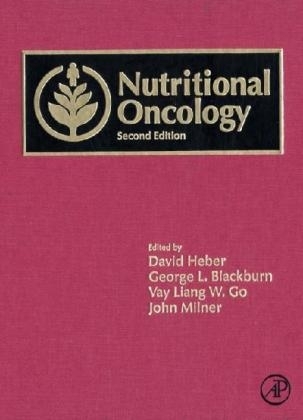
Nutritional Oncology
Academic Press Inc (Verlag)
978-0-12-088393-6 (ISBN)
Nutritional oncology is an increasingly active interdisciplinary field where cancer is investigated as both a systemic and local disease originating with the changes in the genome and progressing through a multi-step process which may be influenced at many points in its natural history by nutritional factors that could impact the prevention of cancer, the quality of life of cancer patients, and the risk of cancer recurrence in the rapidly increasing population of cancer survivors.
Since the first edition of this book was published in 1999, the idea that there is a single gene pathway or single drug will provide a cure for cancer has given way to the general view that dietary/environmental factors impact the progression of genetic and cellular changes in common forms of cancer. This broad concept can now be investigated within a basic and clinical research context for specific types of cancer. This book attempts to cover the current available knowledge in this new field of nutritional oncology written by invited experts. This book attempts to provide not only the theoretical and research basis for nutritional oncology, but will offer the medical oncologist and other members of multidisciplinary groups treating cancer patients practical information on nutrition assessment and nutritional regimens, including micronutrient and phytochemical supplementation. The editors hope that this volume will stimulate increased research, education and patient application of the principles of nutritional oncology.
NEW TO THIS EDITION:
* Covers hot new topics of nutrigenomics and nutrigenetics in cancer cell growth
* Includes new chapters on metabolic networks in cancer cell growth, nutrigenetics and nutrigenomics
* Presents substantially revised chapters on breast cancer and nutrition, prostate cancer and nutrition, and colon cancer and nutrition
* Includes new illustrations throughout the text, especially in the breast cancer chapter
Dr. Heber is Professor Emeritus of Medicine and Public Health at the David Geffen School of Medicine at UCLA. He is also the Founding Director of the UCLA Center for Human Nutrition and founding Chief of the Division of Clinical Nutrition in the UCLA Department of Medicine. He has directed interdisciplinary research centers on Cancer and Nutrition and Botanical Dietary Supplements. Dr. Heber is board-certified in Internal Medicine, and Endocrinology and Metabolism by the American Board of Internal Medicine and is a certified Physician Nutrition Specialist. He earned his MD at Harvard Medical School, and his Ph.D. in Physiology at the University of California, Los Angeles. He has published over 250 research papers, and is a fellow of the American Society for Nutrition. Dr. Heber's research centers on the role of nutrition, phytonutrients, and botanical dietary supplements in gene-nutrient interaction, and modulation of the microbiome. Professor of Medicine, David Geffen School of Medicine at UCLA; Associate Director, UCLA-NIH Clinical Nutrition Research Unit
EDITOR-IN-CHIEF
Contributing Authors
Preface
Introduction: The Principles of Nutritional Oncology
I: Biology of Nutrition and Cancer
Chapter 1: Fundamentals of Human Nutrition
Chapter 2: Nutrigenomics and Nutrigenetics
Chapter 3: Genetics and Epigenetics in Cancer Biology
Chapter 4: Metabolic Networks in Cancer Cells
Chapter 5: Energy Balance and Cancer
II: Epidemiology of Nutrition and Cancer
Chapter 6: Nutritional Epidemiology
Chapter 7: Fruit and Vegetable Consumption and Cancer
Chapter 8: Are Whole Grains Protective Against a Variety of Cancers?
Chapter 9: Obesity and Cancer Risk
Chapter 10: Nutrition and Tobacco-Related Cancers
Chapter 11: Alcohol and Cancer
Chapter 12: Environmental Toxins, Nutrition, and Cancer
III: Biological Approaches to Investigating Nutrition and Cancer
Chapter 13: Endocrine and Paracrine Factors in Carcinogenesis
Chapter 14: Oxidation and Antioxidation in Cancer
Chapter 15: Thiols in Cancer
Chapter 16: Principles of Tumor Immunology
Chapter 17: Animal Models in Nutritional Oncology Research
IV: Gene-Nutrient Interaction and Cancer Prevention
Chapter 18: The Challenge of Nutrition in Cancer Prevention
Chapter 19: Dietary Assessment
Chapter 20: Prostate Cancer
Chapter 21: Breast Cancer
Chapter 22: Skin Cancer
Chapter 23: Colon Cancer
Chapter 24: Gastric Cancer
Chapter 25: Pancreatic Cancer
Chapter 26: Bladder Cancer
Chapter 27: Differentiation Induction in Leukemia and Lymphoma
V: Bioactive Food Components and Botanical Approaches to Cancer
Chapter 28: Dietary Supplements in Cancer Prevention and Therapy
Chapter 29: Dietary Fiber and Carbohydrates
Chapter 30: Dietary Lipids
Chapter 31: Calcium and Vitamin D
Chapter 32: Soy Isoflavones
Chapter 33: Selenium and Cancer Prevention
Chapter 34: Glucosinolates
Chapter 35: Green Tea
Chapter 36: Garlic
Chapter 37: Berries
Chapter 38: Isoprenoids and Novel Inhibitors of Mevalonate Pathway Activities
VI: Nutritional Assessment and Support of the Cancer Patient
Chapter 39: Cancer Anorexia and Cachexia
Chapter 40: Weight Management in the Breast Cancer Survivor
Chapter 41: Nutrition Support of the Adult Cancer Patient
Chapter 42: Assessing Endocrine Effects of Cancer and Ectopic Hormone Syndromes
Chapter 43: Counseling the Cancer Survivor
Chapter 44: Nutritional Support and Quality of Life
VII: Nutritional Implementation Guidelines and Practice
Chapter 45: Modern Statistical Methods in Clinical Nutrition
Chapter 46: Evidence-based Practice Management in Cancer Prevention and Treatment
Chapter 47: Dietary Guidelines in Cancer Prevention
Chapter 48: Dietary Interventions
Chapter 49: Future Directions in Cancer and Nutrition Research: Gene–Nutrient Interactions, Networks, and the Xenobiotic Hypothesis
Index
| Erscheint lt. Verlag | 23.5.2006 |
|---|---|
| Mitarbeit |
Chef-Herausgeber: George L. Blackburn |
| Verlagsort | San Diego |
| Sprache | englisch |
| Maße | 216 x 279 mm |
| Gewicht | 2150 g |
| Themenwelt | Medizin / Pharmazie ► Medizinische Fachgebiete ► Onkologie |
| ISBN-10 | 0-12-088393-7 / 0120883937 |
| ISBN-13 | 978-0-12-088393-6 / 9780120883936 |
| Zustand | Neuware |
| Haben Sie eine Frage zum Produkt? |
aus dem Bereich


